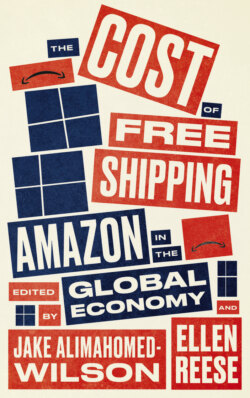Читать книгу The Cost of Free Shipping - Группа авторов - Страница 28
На сайте Литреса книга снята с продажи.
THE WIDER CONTEXT
ОглавлениеIncreasingly sophisticated information technologies and networks have assisted capitalist growth and domination. Behind the expansion and popularization of the World Wide Web was global capital, which stood to benefit greatly from improved access to, and connection between, markets and consumers. Thus, capitalism helped to birth the digital world that enables Amazon and other corporations in the modern era. Digital technology companies are the robber barons of the age—huge, muscular, and almost hegemonic. It is difficult to avoid interacting with them, especially after they have gutted local businesses that were previously sources for consumer products.
Amazon encourages people to be zealous consumers while it empowers states to monitor and control entire populations. If Amazon’s power and influence continues to grow, we will become consumers and state subjects only. Where is our free will when Amazon knows what we “want” (perhaps even before we do)? Or when the state can monitor all of our movements, with Amazon’s help? The incredible asymmetries of knowledge and power between corporations and citizens that exist under surveillance capitalism is not accidental or inevitable but reflects corporate interests in maximizing profits and social control, and the growing power and influence of large corporations.
The market position Amazon now occupies, its tremendous cache of personal user data, and the alarming human expectations it has created are troubling. It has empowered incredible corporations and governmental agencies, put everyday people at risk of manipulation and exploitation, and encouraged millions to take ongoing surveillance for granted. Presumably, if Amazon wasn’t doing all this, it would be just another corporation. The problem is not so much this one, singular bad actor, as it is an unregulated economic system that facilitates monopolies, crushes workers, and addicts and spies on consumers generally. Such a corporation is all but predictable under late capitalism’s neoliberal political economy. Amazon has become the dominant actor in e-commerce and its current edge is all but guaranteed by surveillance technologies, other corporations’ reliance upon AWS, and fang-less antitrust legislation. These trends will likely continue unless government intervention, civil society pressure, tactical obstruction from digital denizens and hacktivists, internal resistance by workers, or some combination of all, prevent Amazon’s advance. Instead, grassroots-led resistance involving citizens, labor, and social movements offer the best chances to create a more equitable and liberatory outcome.
Despite the formidable challenges to everyday people and workers and their privacy, there are avenues of resistance. To select one small example, when the Canonical corporation—which distributes the world’s most popular Linux operating system Ubuntu—pre-installed an app that would direct all internal searches (and thus personal information) to Amazon.com, an uproar occurred in the tech world. Canonical quickly created a way for Ubuntu users to disable the app (which users called “spyware”) and the controversy was the primary factor that led software privacy advocates to “fork” Ubuntu and create an Amazon-free Ubuntu operating system called Mint. Such small as well as substantial acts of resistance continue to occur, creating challenges in the face of Amazon’s march toward greater and greater profits and power.
In the future, transnational alliances to challenge the power of corporations like Amazon will be crucial. As an entity with international reach, Amazon not only has a wide capacity to cause harm, but is also open to attack everywhere, too. Coordinated actions—whether consumer boycotts or worker strikes, hactivist actions and online campaigns, or the creation of alternative technologies for a more cooperative economy or for computer-user privacy—offer great opportunity to resist surveillance capitalism and Amazon.42
